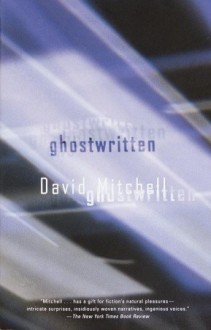
"I wonder what happened to him, I wonder what happened to all of them, this wondering is the nature of matter, each of us a loose particle, an infinity of paths through the park, probable ones, improbable ones, none of them real until observed whatever real means, and for something so solid matter contains terrible, terrible, terrible expanses of nothing, nothing, nothing..."
Ordinary human lives, sometimes crisscrossing, sometimes briefly touching, sometimes swiftly passing each other by through the fabric of space and time, creating imperceptible ripples on the surface of some invisible lake of our collective consciousness that eventually lead up to an event of cataclysmic significance....
Everything considered, Ghostwritten is an imperfect masterpiece. In the sense it makes its far-reaching ambitions of being viewed as a tour de force of its generation apparent at the onset but when one sets about to allow oneself keener examination of all its narrative intricacies, it smacks of amateurishness. If, at its best, Ghostwritten is a fascinating meditation on the hollowness of human lives, human fallacies, urban alienation, intertwined fates and our unslakable thirst for validation in the 21st century then at its worst it is a rather complicated mess of styles and themes usually identified with two masters of the craft - Calvino and Murakami. I'd, thus, refrain from calling it masterful and call it the work of a master in the making instead.
There is something so blatantly Murakami-esque about this book, that I am tempted to label Mitchell as Murakami Lite and this is supposed to serve more as a mild chiding rather than approbation of any form. It is like Murakami's ghost (excuse the unintended pun) continuously haunts Mitchell's characters and their lives, his voice reverberating in their unvoiced musings, innermost stream of thoughts, conversations and his invisible presence subtly influencing the magical-realist aspects of the book. So much so there's even a minor character who fleetingly mentions spotting his own doppelganger on the streets of London one day. I almost began anticipating the appearance of talking cats or strange sheep men after this point, although thankfully none were found in the end.
But regrettably enough, this book failed to give me any of those goosebumps-inducing moments of pure intrigue which I have often come to categorize along with the effects produced by Murakami's surrealistic vignettes.
It is also quite obvious Mitchell has distilled the essence of Calvino's Invisible Cities into his own deconstruction of modern day cities like Tokyo, Hong Kong, St Petersburg, London and New York in a 20th-21st century set up. The concept of islets of human existence huddled together in their own miniature niches, disparate yet suffering from similar fates, their ideas of the city they dwell in coalescing clumsily to impart the city its true identity, comes into play here but not under the guise of Calvino's beautifully rendered symbolism.
Prior to picking up this book, I had heard so much about Mitchell and the widespread adoration he enjoys, I was expecting something life-altering and unforgettable. And despite the narrative sweep and all-encompassing nature of the subjects Mitchell touches upon here, Ghostwritten seems to be neither of the aforementioned. At least not in my opinion. And as the novelty of the interconnection among the short story length snippets wears off with the gradual progress of the narrative, the lack of finesse in Mitchell's writing becomes all the more prominent.
"God knows darn well that dabbling in realpolitik would coat his reputation with flicked boogers."
Inclusion of quite a few crude metaphors like the one above just felt jarring to the overall tone of the novel.
I am hoping Cloud Atlas is more accomplished.

 Log in with Facebook
Log in with Facebook 





